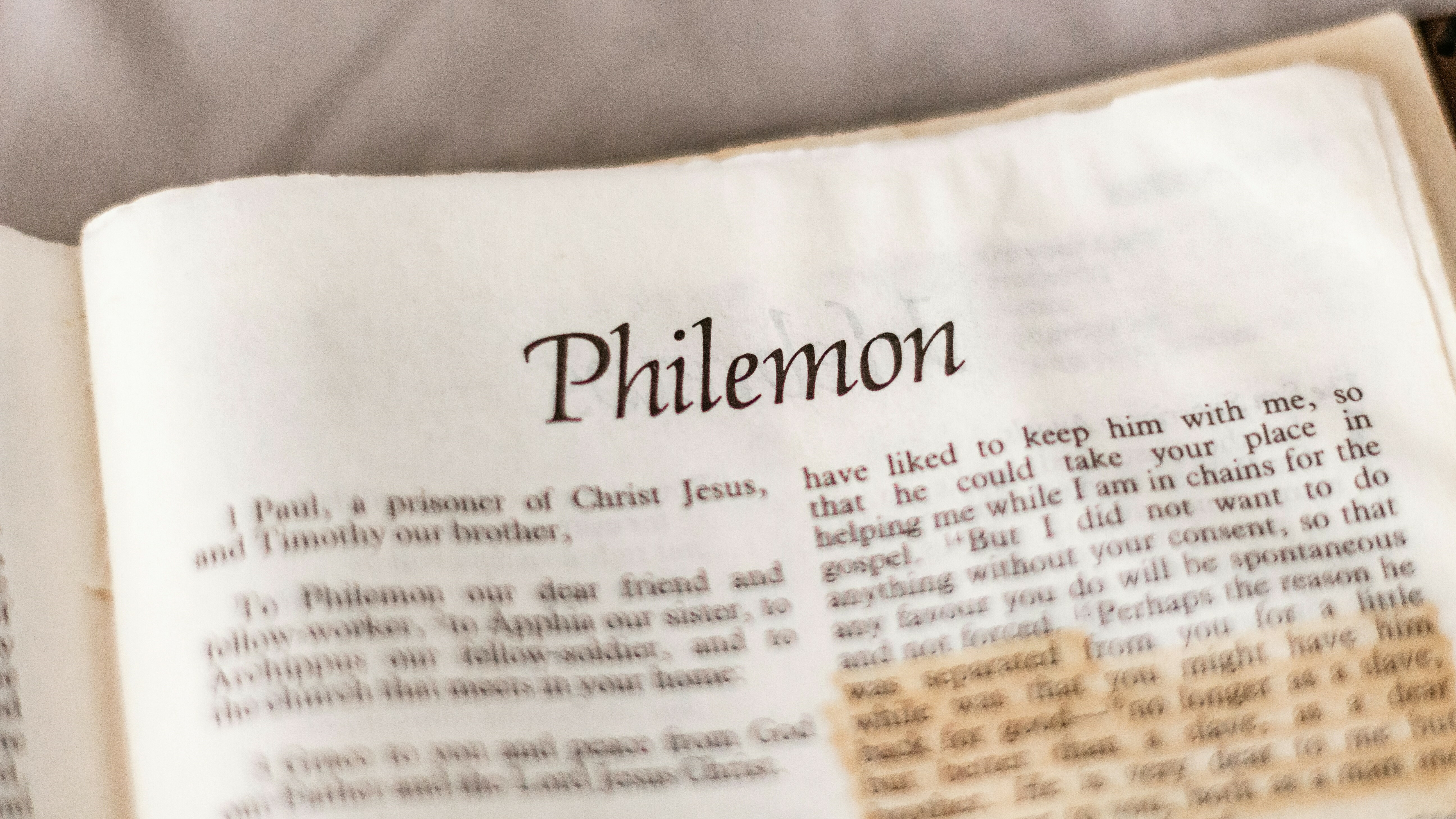TLDR: Philemon shows us Paul’s understanding of the gospel of reconciliation and koinonia left to us by Jesus. In the family of believers we are all equal recipients of God’s forgiveness and grace. More below.
Philemon is the shortest letter of Paul and it has been unanimously accepted as authentic. For context, only seven letters enjoy this status: Galatians, Romans, 1 Corinthians, 2 Corinthians, Philemon, Philippians, and 1 Thessalonians. Theologians are sharply divided on the authorship of Colossians and 2 Thessalonians, with the majority opinion ascribing the authorship to someone other than Paul. Finally, there is almost unanimous consensus that Ephesians, 1 and 2 Timothy, and Titus were written in the style of Paul and were ascribed to him, but were most likely not written by him. In fact, it is believed that these letters were written at least ten years after Paul’s death. Now, let us look at this short letter, which shows us Paul’s gospel in a clear and concise manner, while making claims that are very applicable to us in the 21st century.
Philemon is a prison letter, but the date of authorship depends on the episode of incarceration to which Paul refers. If, as N. T. Wright affirms, Paul was incarcerated in Ephesus, then the letter could have been written there in A.D. 53-56[1]. If it was during the imprisonment in Caesarea, then in A.D. 57 (Acts 12:23-30.) If under house arrest in Rome, then it was in A. D. 60-62 (Acts 28:16.) Finally, if written when Paul was re-arrested in Rome and imprisoned at the Mamertine Prison, then it could be A.D. 64-65. Sadly, we don’t know exactly when it was written.
The short letter has only 25 verses: Salutation, 1-3; Philemon’s love and faith, 4-7; Paul's plea for Onesimus, 8-20; and final greeting and benediction, 21-25.[2] Philemon was a wealthy landowner, who may have been a Roman citizen. He met Paul in Ephesus sometime between A. D. 53-56, where he become a follower of Jesus. He then became a leader at a church planted by Paul’s disciple, Epaphras, which met at his home, where his wife Apphia and their son Archippus were also members. Like most landowners in the Roman world, Philemon owned slaves, one of whom was named Onesimus. This slave wronged Philemon at some point, choosing to run away rather than facing his owner’s wrath. This is the primary conflict of the letter.
Sometime later, Onesimus visited Paul in prison seeking his help in reconciling with Philemon. We don’t know if Paul had known Onesimus before this encounter, but he wasted no time. The slave became a follower of Jesus and Paul’s faithful assistant. Now, Paul has a problem he will need all his tact and intelligence to solve: He wants to keep Onesimus with him to aid in his imprisonment and to assist him in his evangelistic mission, but he knows he can’t do this without Philemon’s consent. “The purpose of the letter is not just to get Philemon to forgive Onesimus, but to embrace him as a brother in the Messiah and no longer as a slave.”[3]
We see Paul’s brilliance at the very start of the letter. “When I remember you in my prayers, I always thank my God because I hear of your love for all the saints and your faith towards the Lord Jesus. I pray that the sharing of your faith may become effective when you perceive all the good that we may do for Christ.” (V. 4-6). The word translated as “the sharing” (of your faith) also means “our partnership” (in the faith.) The Greek word is KOINONIA. It means sharing, mutual participation, and partnership. In the N.T. the word, “suggests communion or fellowship with God—a new relationship offered to believers due to Jesus’ work on the cross… Koinonia indicates a bond based on a shared interest or goal—following after Christ, growing in His love and teachings. However, the word also emphasizes the importance of sharing material goods as a sign of following Jesus’ command to love your neighbor as yourself” (Matthew 22:39.)[4] Later, Paul will affirm that this new relationship between believers who are in Christ means that, “There is no longer Jew or Greek, there is no longer slave or free, there is no longer male and female; for all of you are one in Christ Jesus” (Galatians 3:28-29).
Koinonia means that mutual love and respect is expected of all who follow Jesus as Messiah. In Christ all divisions end, especially if they are based on ethnicity, race, social class, or social constructs like slavery, servanthood, proscribed professions, etc. There is a oneness that is expected of all believers, “For this reason, though I am bold enough in Christ to command you to do your duty, yet I would rather appeal to you on the basis of love— and I, Paul, do this as an old man, and now also as a prisoner of Christ Jesus.” What is this duty which Paul says Philemon has? It is as if Paul is saying, “I brought you into the faith, you are my disciple, you owe me respect and obedience. In the Messiah, I brought you out of spiritual slavery into freedom and new life.” Yet, rather than demanding that Philemon forgive and welcome Onesimus as a brother, Paul leaves the decision up to him, so that his favor may not be based on obligation, but love. Then he adds, “Will you deny an old man? Will you in your freedom deny a prisoner of Christ Jesus? Can you show me your love and fidelity at my desperate hour?”
It is only at this point that Paul asks, “I am appealing to you for my child, Onesimus, whose father I have become during my imprisonment.” Onesimus, very much like Philemon, can be considered a child or a close family member of Paul through conversion. And, as a dutiful family member, he has been serving Paul, who wants to keep him to care for him and assist in the spreading of the Gospel. Onesimus’ unresolved conflict must be resolved before this is possible. Slaves provide important services to masters, but these are nothing in comparison with the love relationship a brother in Christ can offer an equal. Onesimus was “formerly useless to you, but now he is indeed useful both to you and to me.”
Now, what is at stake for Philemon? For starters, Paul is asking Philemon to give up his legal rights under Roman law to have Onesimus punished or put in prison. The master must forego avenging his honor, seriously offended the moment Onesimus escaped. To welcome him back without punishment sets a precedent for other slaves who might now believe that becoming Christians guarantees their freedom. This will upset the social status quo around slavery. How will he explain this to other Christian slave owners? To welcome back his slave into Colossae as a social equal will be to act foolishly. This is unheard of in the society of the day. Philemon may lose status or respect in the highly conservative Roman system of the day. This may have political and communal implications.
Why would Philemon do this? It is an incredibly difficult decision, but Paul may be giving Philemon a big rock to hide behind. “So if you consider me your partner, welcome him as you would welcome me. If he has wronged you in any way, or owes you anything, charge that to my account.” Although we believe these words to be a rhetorical flourish, Philemon can call the release the “paying of a debt owed to Paul,” or the “transfer of ownership to Paul, who will pay the price of redemption.” This will provide a way to save face with his other slaves and his community. But Paul is making a deeper argument. Above all, the Gospel of Jesus is about two things: a. reconciliation and b. Koinonia. In terms of reconciliation, this is how Paul puts it someplace else, “in Christ God was reconciling the world to himself, not counting their trespasses against them, and entrusting the message of reconciliation to us.” (2 Corinthians 5:19.) Paul has accepted this command by agreeing to pay the price for Onesimus’ reconciliation with Philemon. The Gospel is also Koinonia: Onesimus and Philemon are equal before God, they share the same need for forgiveness. “The ground is leveled before the cross, which means that they can no longer relate to each other as master and slave. They are brothers in the Messiah. This is what Koinonia in the Lord Jesus means.”[5]
Twice Paul says, “I am writing this letter with my own hand” and “I will pay the debt.” This matter is so important that Paul is not relying on a scribe. His effort honors Philemon. But then, Paul appeals to his relationship with the wealthy man, calling him, “brother,” and asking for a personal favor, “let me have this benefit from you in the Lord! Refresh my heart in Christ.” This is a big, costly ask, but Paul is confident that Philemon will grant him his desire. The fact that the letter was preserved and disseminated throughout the churches point to a positive response from Philemon. Sadly, we don’t know what the implications of granting this request were for Philemon, but we know that “The implications of the Good News are personal and never private.”[6] If the Church is a koinonia in the Lord Jesus, then all distinctions based on race, gender, employment, legal status, and class have no place in the Church. In the family of believers of Jesus we are all equal recipients of God’s compassion, forgiveness, and grace.
This is the message of Philemon. Jesus’ gospel entails reconciliation with God and each other, as well as koinonia (brotherhood, sisterhood, equal status, mutual love and affection, unity, etc.) We are in desperate need of this message today.
May our Lord continue to bless you,
Fr. Roman+
[1] N.T. Wright, Paul: A Biography (Harper One, 2018), pp. 239-240, 260-269, 555.
[2] National Council of Churches of Christ in the United States of America, NRSV Bible, Copyright, 1995.
[3] The Bible Project: Philemon, https://www.youtube.com/watch?v=aW9Q3Jt6Yvk
[4] https://www.christianity.com/wiki/christian-terms/what-does-koinonia-mean-in-the-bible.html
[5] The Bible Project: Philemon, https://www.youtube.com/watch?v=aW9Q3Jt6Yvk
[6] Ibid





